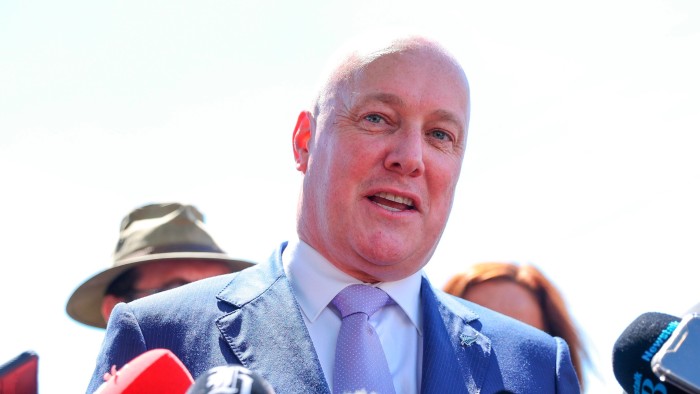Unlock the Editor’s Digest for free
Roula Khalaf, Editor of the FT, selects her favourite stories in this weekly newsletter.
New Zealand is seeking to attract more wealthy investors by loosening rules tied to so-called ‘golden visas’, dropping an English-language requirement and cutting the number of days that applicants need to spend in the country.
‘Golden visas’ have long been used to attract the rich to smaller economies, but European countries, including Spain, Portugal and Ireland, have scrapped schemes linked to real estate purchases in recent years due to rising property prices.
New Zealand has bucked that trend as part of the centre-right government’s plan to boost foreign investment in the recession-hit country.
“We need to say a lot more yes and a lot less no in New Zealand,” Prime Minister Christopher Luxon said at a press conference on Sunday, saying the changes were about “rolling out the welcome mat” to investment.
Would-be investors can apply for a visa if they are willing to invest NZ$5mn ($2.8mn) directly into the country’s businesses.
Applicants will only be required to spend 21 days in New Zealand over three years to qualify for residency, compared with 117 days over four years under the previous scheme.
Visas are also available for those willing to invest at least NZ$10mn over five years and live in the country for 105 days during that period.
Erica Stanford, the country’s immigration minister, told local media that some international investors found requirements to reside in the country for long periods a “turn-off”.
New Zealand has long looked to wealthy investors to bolster its economic development.
That caused friction in 2017 with the revelation that billionaire Peter Thiel, who had donated to Donald Trump’s election campaign, had been secretly granted New Zealand citizenship despite not meeting the eligibility criteria. Thiel planned to establish a venture fund in the country.
The previous government, headed by Jacinda Ardern, tightened rules around investment visas in 2022 in an attempt to direct more foreign investment into New Zealand’s companies rather than stocks and bonds.
But only 20 people applied for the ‘Active Investor Visa’ introduced by the Ardern government, according to reports last year, a tenth of the number of applicants under the previous scheme.
Just NZ$70mn had been invested under the Ardern scheme since its introduction in 2022, according to Nicola Willis, New Zealand’s minister for finance and economic growth. This compared with NZ$2.2bn in the two years until 2020 under the previous scheme.
Luxon, a former Unilever and Air New Zealand executive, has set about repealing many of the Labour government’s signature policies, lifting a ban on oil and gas exploration in the country’s waters and dropping a strict smoking ban.
He has made “fixing the economy” his biggest priority with the country’s GDP shrinking 1 per cent in the September quarter last year.
Justin Murray, an investment banker at Murray & Co, said that the latest visa move was a “sensible initiative that signals we’re open again”, adding: “The second that a high-quality, wealthy migrant gets the sense they’re not welcome, it switches them off.”
Read the full article here




